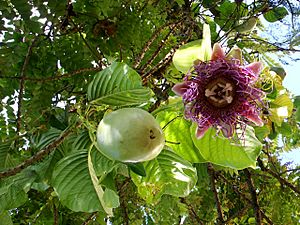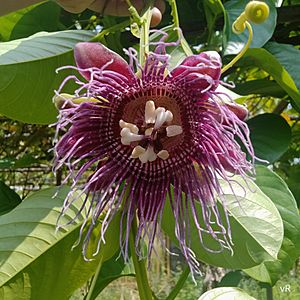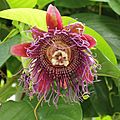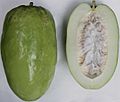Giant granadilla facts for kids
Quick facts for kids Giant granadilla |
|
|---|---|
 |
|
| Scientific classification | |
| Genus: |
Passiflora
|
| Species: |
quadrangularis
|
The Passiflora quadrangularis, also known as the giant granadilla, is a very interesting plant. It's sometimes called barbadine in Trinidad and Tobago, grenadine in Haiti, or badea (pronounced ba-THAY-ah). This plant grows the biggest fruit of any species in its family, Passiflora. It's a plant that lives for many years and climbs like a vine. It originally comes from warm, tropical parts of America.
Contents
What the Giant Granadilla Looks Like
This plant is a strong, climbing vine that stays green all year. It has pretty red flowers that hang down. Each flower has white and purple parts that look like threads. The leaves are smooth and can be shaped like a heart or an oval. The stems that hold the leaves (called petioles) have small bumps (called glands) on them.
The flowers smell nice, and the plant grows a very large, oval-shaped fruit. This fruit can be up to 12 inches (about 30 cm) long! Inside, it has many seeds surrounded by a slightly sour, tasty pulp that you can eat.
How People Use the Giant Granadilla
People sometimes grow the badea plant in special heated rooms called greenhouses. The fruits of many other Passiflora plants are also eaten. For example, P. laurifolia is known as the water lemon, and P. maliformis is called the sweet calabash in the Caribbean.
The juice from the badea fruit is often used to make a refreshing drink. In some parts of Sri Lanka, the fruit is called ටං ටිං or ටුං ටුං. There, people cook it as a vegetable curry. The seeds can be eaten as a snack or used to make juice.
A special tea can be made from the leaves of the plant. This tea is sometimes used to help with health issues like high blood pressure and diabetes. You can also make a drink and even ice cream from the fruit!
Growing the Giant Granadilla as an Ornamental Plant
The Passiflora quadrangularis is also grown just for its beauty, not just for its fruit. When grown in cooler places, it needs to be kept warm, at least 15°C (59°F). This means it often has to grow inside a glasshouse or greenhouse. This plant is so lovely that it has won an important award called the Royal Horticultural Society's Award of Garden Merit. This award means it's a great plant for gardens.
Gallery
See also
 In Spanish: Parcha para niños
In Spanish: Parcha para niños






